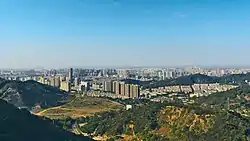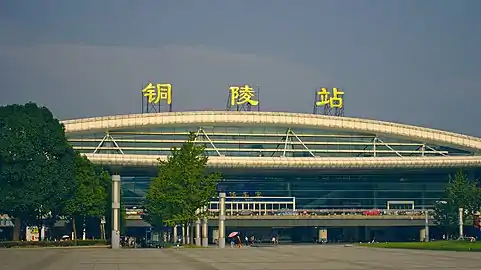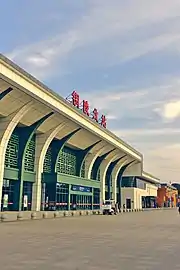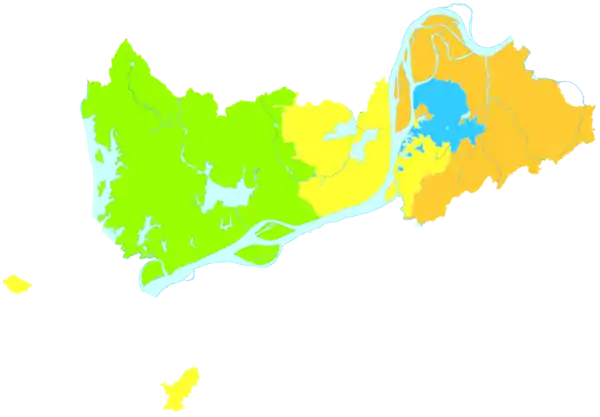Tongling
Tongling (simplified Chinese: 铜陵; traditional Chinese: 銅陵; pinyin: Tónglíng; Wade–Giles: T'ung-ling; lit. 'Copper Hillock'; former names: Tunglinghsien, Tungkwanshan) is a prefecture-level city in southern Anhui province. A river port along the Yangtze River, Tongling borders Wuhu to the east, Chizhou to the southwest and Anqing to the west.
Tongling
铜陵市 | |
|---|---|
 | |
.png.webp) Location of Tongling City jurisdiction in Anhui | |
| Coordinates (Tongling municipal government): 30°56′42″N 117°48′40″E | |
| Country | People's Republic of China |
| Province | Anhui |
| County-level divisions | 3 districts 1 county |
| Municipal seat | Tongguan District |
| Government | |
| • CPC Secretary | Li Meng (李猛) |
| • Mayor | Hu Qisheng (胡启生) |
| Area | |
| • Total | 3,008 km2 (1,161 sq mi) |
| Population (2017[1]) | |
| • Total | 1,700,000 |
| • Density | 570/km2 (1,500/sq mi) |
| Time zone | UTC+8 (China Standard) |
| Area code(s) | 0562 |
| ISO 3166 code | CN-AH-07 |
| GDP | ¥115 billion[2] |
| GDP per capita | ¥67,647 |
| License plate prefix | 皖G |
| Website | tl |
The asteroid 12418 Tongling was named after the city.
Geography
Tongling is located in southern Anhui on the southern (right) bank of the lower reaches of the Yangtze River, with latitude ranging from 30° 45' 12" to 31° 07' 56" N and longitude ranging from 117° 42' 00" to 118° 10' 06" E; the maximal north–south extent is 42.5 kilometres (26.4 mi), and the greatest east–west width is 40.6 km (25.2 mi).[3] It borders Fanchang County to the southeast, Qingyang County and Nanling County to the south, Guichi District of Chizhou to the southwest, and, northwest across the Yangtze, Wuwei County and Zongyang County.
| Climate data for Tongling (1981–2010 normals) | |||||||||||||
|---|---|---|---|---|---|---|---|---|---|---|---|---|---|
| Month | Jan | Feb | Mar | Apr | May | Jun | Jul | Aug | Sep | Oct | Nov | Dec | Year |
| Average high °C (°F) | 7.3 (45.1) |
9.8 (49.6) |
14.5 (58.1) |
21.2 (70.2) |
26.6 (79.9) |
29.3 (84.7) |
32.8 (91.0) |
32.2 (90.0) |
27.9 (82.2) |
22.7 (72.9) |
16.4 (61.5) |
10.1 (50.2) |
20.9 (69.6) |
| Daily mean °C (°F) | 3.6 (38.5) |
5.9 (42.6) |
10.1 (50.2) |
16.4 (61.5) |
21.8 (71.2) |
25.2 (77.4) |
28.6 (83.5) |
27.9 (82.2) |
23.6 (74.5) |
18.1 (64.6) |
11.9 (53.4) |
6.0 (42.8) |
16.6 (61.9) |
| Average low °C (°F) | 0.9 (33.6) |
2.9 (37.2) |
6.8 (44.2) |
12.7 (54.9) |
18.0 (64.4) |
21.8 (71.2) |
25.4 (77.7) |
24.7 (76.5) |
20.3 (68.5) |
14.7 (58.5) |
8.4 (47.1) |
3.0 (37.4) |
13.3 (55.9) |
| Average precipitation mm (inches) | 67.9 (2.67) |
75.8 (2.98) |
127.7 (5.03) |
136.3 (5.37) |
155.3 (6.11) |
251.5 (9.90) |
174.0 (6.85) |
129.1 (5.08) |
85.3 (3.36) |
73.5 (2.89) |
73.5 (2.89) |
42.6 (1.68) |
1,392.5 (54.81) |
| Average relative humidity (%) | 77 | 76 | 75 | 74 | 74 | 79 | 78 | 80 | 80 | 77 | 76 | 73 | 77 |
| Source: China Meteorological Administration[4] | |||||||||||||
Administration
The prefecture-level city of Tongling administers 4 county-level divisions, including 3 districts and 1 county.
- Tongguan District (铜官区)
- Jiao District (郊区)
- Yi'an District (义安区)
- Zongyang County (枞阳县)
In 2012, the provincial government made plans to cede Zongyang County from Anqing City to Tongling City, in order to grant the latter land across the Yangtze.[5]
| Map | ||
|---|---|---|
- Defunct divisions
- Tongguanshan District (铜官山区)
- Shizishan District (狮子山区)
History
Tongling has been famous as a beautiful mountain city since its origins in the Han dynasty over 1500 years ago. Owing to its copper and tin deposits, it was an important center in the past for bronze production. The scale of industrial activity gradually increased through the Ming (1368–1644) and Qing (1644–1911) dynasties, the Japanese occupation of 1938–45, and especially under the Communist government since 1949.
Economy
Today the city's industrial base still revolves around the several nearby copper mines and copper processing operations. The local mineral resources also include : iron, coal, gold, silver, tin, Iron sulfide, plus more than twenty other rare minerals associated with them such as nickel, cadmium, gallium, molybdenum, germanium and selenium. Other important industries include chemical works, textiles, building materials, electronics, machinery and food processing. Long a hub of water transportation, in 1995 Tongling became the site of Anhui Province's first highway bridge spanning the Yangtze River.
Although Tongling City is mostly mountainous, the surrounding flatlands are rich agricultural regions producing rice, wheat, cotton, beans, garlic, herbal medicines and ginger. Large amounts of fish are also harvested in the region.
Tongling is the center for conservation efforts to preserve the last remaining Yangtze freshwater dolphins. Two semi-natural reserves have been established in the Tongling area, in the Tongling and Shishou oxbow lakes, but as yet no dolphins have been successfully captured and moved from the river into the lakes.
Tongling has developed at a rapid speed in the past 5 years, i.e. 2003 to 2007.The average GDP per capita has reached ¥44,870 in 2008 which is the second in Anhui province. And the increasing rate is 13%, far more than the average increasing rate of the whole province which is 12.8%.And it aims to achieve $10000 GDP per capita in 2012.
As of 2016, Tongling City, administered 3 districts and 1 county, the total population of 1.7185 million people. GDP of 95.73 billion yuan. By industry, the added value of the primary industry was 4.89 billion yuan, the added value of the secondary industry was 56.96 billion yuan, and the added value of the tertiary industry was 33.87 billion yuan. The three industrial structures are 5.1: 59.5: 35.4. According to the resident population, the annual per capita GDP is 59,960 yuan.
Transport
As of November 2017, Tongling has two bridges across the Yangtze River.
Rail
Tongling is served by the Nanjing–Tongling, Tongling–Jiujiang, Lujiang-Tongling Railways, Nanjing–Anqing Intercity Railway and Hefei-Fuzhou High-Speed Railway.
 Tongling Station
Tongling Station Tongling North Station
Tongling North Station
Culture
The famous poet of Tang Dynasty, Li Bai (c.700–762, also known as Li Po) praised the beauty and richness of Tongling. The Tongling Sports Centre Stadium is located in the city. The football stadium has a capacity of 30,000 and it opened in 2018.
Tongling ginger
Tongling ginger is one of the "eight treasures" of Tongling. It is a perennial herb and an annual cultivated crop. Tongling ginger is scientifically identified by the Anhui Academy of Agricultural Sciences Horticulture and belongs to the type of white ginger. The fresh ginger skin is white and slightly yellow, the ginger is bergamot-shaped, and the petals are thick and thick.
Tongling dried tofu
Tongling dried tofu which began production in the Ming Dynasty and has a history of more than 400 years. Because Datong Town is the only way to the Buddhist shrine Jiuhua Mountain, pilgrims worshipping Buddhas from all over the country and Korea, India and other countries must purchase Tongling dried tofu for vegetarian food.
International relations

The contract of town-twinning with the city of Marbach am Neckar in Baden-Württemberg, Germany was established in 1990 and was among the first Sino-German town-twinnings, or sister city relationships. One lady citizen of Marbach am Neckar has been awarded honorary citizenship of Tongling City in 2005, recognizing her relentless effort to keep up the town-twinning. Marbach is the birthplace of the famous German poet Friedrich Schiller (1759–1805), as a symbol of friendship a statue was erected in local Tianjinhu-Lake-Park.
Tongling has been twinned with the Borough of Halton in England since 1997. A Chinese friendship garden was created in the grounds of Runcorn Town Hall in 2006, including a bronze statue gifted by the twin city of Tongling.[6]
References
- 铜陵市情. Tongling People's Government.
- 铜陵市情. Tongling People's Government.
- 铜陵城市介绍 (in Chinese). Weather China. Retrieved 2013-01-07.
- 中国气象数据网 - WeatherBk Data (in Chinese). China Meteorological Administration. Retrieved 2020-04-12.
- 我省出台方案落实中部崛起新政 细化83项重点工程. Tongling People's Government. Retrieved 2013-01-07.
- "Friendship garden is full of Eastern promise". Cheshire Live. Reach plc. 22 June 2006. Retrieved 2 November 2020.
"China Tongling". Tongling People's Government. Retrieved 22 March 2013.
"Tongline News". Tongling News. Retrieved 22 March 2013.
External links
- Government website of Tongling (in Simplified Chinese)
